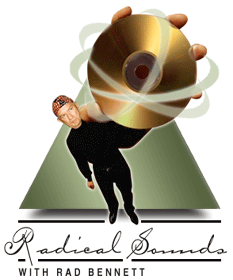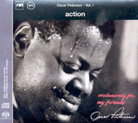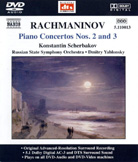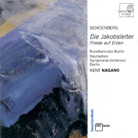 |
| July 1, 2004 5.1 Fun It’s July, and there is no advanced-resolution disc in
either format re-creating the battles of Trenton, Valley Forge, or Gettysburg. But a new
hybrid 5.1-channel SACD from Chesky gives one the impression that if those patriotic
events were ever to be recorded, David Chesky would be the man to produce them. The disc
at hand now is called (take a deep breath) Dr. Chesky’s Magnificent,
Fabulous, Absurd, and Insane Musical 5.1 Surround Show. Its 38 tracks mix sound
effects, environmental surrounding sounds, and music in a most delightful way. A cartoon
balloon on the back cover proclaims, "Buy this disc. This disc will change your life
and bring you much happiness." I do not know about the former but will surely vote
for the latter, having had a splendid, upbeat time playing it and playing with it. It’s July, and there is no advanced-resolution disc in
either format re-creating the battles of Trenton, Valley Forge, or Gettysburg. But a new
hybrid 5.1-channel SACD from Chesky gives one the impression that if those patriotic
events were ever to be recorded, David Chesky would be the man to produce them. The disc
at hand now is called (take a deep breath) Dr. Chesky’s Magnificent,
Fabulous, Absurd, and Insane Musical 5.1 Surround Show. Its 38 tracks mix sound
effects, environmental surrounding sounds, and music in a most delightful way. A cartoon
balloon on the back cover proclaims, "Buy this disc. This disc will change your life
and bring you much happiness." I do not know about the former but will surely vote
for the latter, having had a splendid, upbeat time playing it and playing with it.
First off, it is impeccably recorded. The dynamic and frequency ranges are awesome. The five channels are used to immerse the listener in a sound that seems natural, even when his brain knows it cannot be. Some music is contrived: lead vocal in front, backing vocals in the rear. But other segments put the listener into a scene, such as "Music for Cello, Helicopter, and Cars," or "The New York Subway Ride," or "The Storm," which also puts the .1 subwoofer channel to good use. My favorite sequence might well be four tracks that segue into one another to form a sound-and-music portrait of Africa, though I also enjoyed "Music for Western Percussion." Other discs have used sound effects to demonstrate stereo or multichannel effects. The difference about this one is that it all sounds musical, even when there is no music. The answer lies in the credits: "Composed and arranged by David Chesky." Oh yes, it’s sort of a test disc, too. It demonstrates channel balance and separation, but there are also cool tracks that test a subwoofer: "50Hz Heartbeat," "40Hz Heartbeat," "30Hz Heartbeat," and "20Hz Heartbeat," each prefaced with a pseudo-African chant announcement. The whole effect is imaginative, and lots more fun than the usual pedantic announcer followed by a test tone. Have fun with this disc, then check out the three other great selections that made the cut this month:
In the 1960s, the owner of MPS Records, Hans Georg Brunner-Schwer, would record Oscar Peterson at private parties given in his home in Villengen. Also an engineer and producer, Brunner-Schwer would get things started, then disappear to a studio upstairs, where he would watch the concert on closed-circuit TV. Because the atmosphere was relaxed yet, to an extent, controlled, Peterson and his trio were able to play with abandon and spontaneity. Six vinyl LPs were culled from these music parties: Action, Girl Talk, The Way I Really Play, My Favorite Instrument, Mellow Mood, and Travelin’ On. Peterson’s original trio, with Ray Brown on bass and Ed Thigpen on drums, executes the first, while My Favorite Instrument features Peterson solo. The other sets were recorded with Peterson’s new trio: bassist Sam Jones and drummer Bob Durham. The results made me think I’d died and gone to jazz heaven. These rhapsodic, energetic, yet often mellow performances establish one standard after another. It’s easy to call at least half these readings definitive, the other half in the top ten percent. My favorites: "At Long Last Love," "Waltzing is Hip," "Lulu’s Back in Town," "Little Girl Blue," "Green Dolphin Street," and "Quiet Nights of Quiet Stars." They and all the others are recorded in immaculate, intimate sound. Since the beginning of SACD and DVD-Audio, I have advocated that the recording formats should play a role in archival material, not just new multichannel recording. These sessions are proof of that. The discs have a warm, natural, highly detailed sound that’s not possible with a regular CD. One needs either analog vinyl or those extra bits and sampling rates to produce every detail of such nuanced performances. SACD gives it to us without the surface noise of vinyl, which makes the sound 10 degrees more realistic. Pop one of these superlative discs in your SACD player and see if you don’t agree. This is the audio textbook on jazz piano-trio playing. It doesn’t get better.
Sergei Rachmaninoff was a formidable pianist, and wrote these concertos with his own virtuosic skills in mind. They are difficult works; the third has obtained a particularly awesome reputation from the movie Shine. In that film, a biography of concerto soloist wannabe David Helfgott, it is referred to as "The Rach," as if it were a scourging disease. Yet many pianists play it well. Surely Konstantin Scherbakov has no technical problems with it, or with the earlier Concerto No. 2. His vision of these pieces is large and romantic, with an especially effective use of rubato, and he uses his impressive technique as a means to an end. Conductor Dmitry Yablonsky partners him hand in glove, getting the orchestra members to feel the slight pauses and hesitations that complement the soloist’s style. The resulting balance of heart and mind works: These are among the best performances of these works in the entire catalog. And they are multichannel and glorious to hear. The orchestra is spread across the front three channels; the piano is anchored in the middle one, though bled a bit to left and right. The stage depth is excellent, and the generous reverb gives the impression of a medium-size hall. The overall sound is warm, rich, and exciting, yet I heard details in these readings I have not noticed in other renditions. The performances are also available on a hybrid multichannel SACD. The DVD-A sounds slightly cleaner to me, but I could not perform a fair test because I use different players for the two formats. Still, I don’t think you could go wrong with either. And because Naxos provides no video extras on the DVD-A, there is less competition than usual between the two formats.
Kent Nagano is the music director of the Deutsches Symphonie-Orchester Berlin. His first Harmonia Mundi recording with that stellar ensemble was Beethoven’s oratorio Christus am Ölberge. I welcomed that multichannel SACD recording, and gave it high marks for performance and sound. This Schoenberg disc, featuring the composer’s unfinished oratorio on the subject of Jacob and his dream of the ladder to heaven, is the second from the same forces. Though the repertory could not be more different, my rating is still high. Nagano has singular communication with his musicians, drawing the best tone and performance from each one. He balances the lyric and the dramatic with ease, and makes his points clear so that his players catch on without a hitch. Virtuoso solo and ensemble playing seem to be normal for this orchestra and its outstanding musicians. As before, the recording team, too, is on its toes. The soundstage has ideal width and depth and the dynamic range is outstanding -- impressive but never exaggerated. All of the instrumental choirs have impressive presence, and each note’s attack is absolutely clean and clear. As with the first CD, the choice of soloists is impeccable. All are outstanding and very well placed in the mix, just in front of the orchestra; the balance between them and the orchestra and chorus is perfect. Two recordings in a row of such high quality whet my appetite for more Nagano-Berlin SACD recordings from Harmonia Mundi. It promises to be a series to watch, one in which each new release will be keenly anticipated. ...Rad Bennett
Ultra Audio is part of the SoundStage! Network. |
 Oscar Peterson:
Exclusively for My Friends, Vols. 1-6
Oscar Peterson:
Exclusively for My Friends, Vols. 1-6 Rachmaninoff: Piano
Concertos Nos. 2 and 3
Rachmaninoff: Piano
Concertos Nos. 2 and 3 Schoenberg: Die
Jakobsleiter; Fried auf Erden
Schoenberg: Die
Jakobsleiter; Fried auf Erden